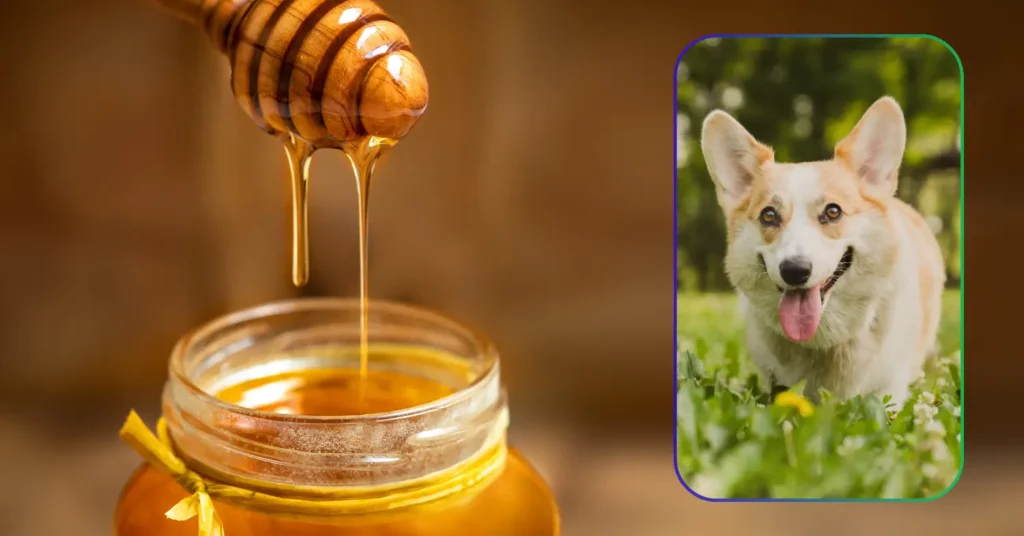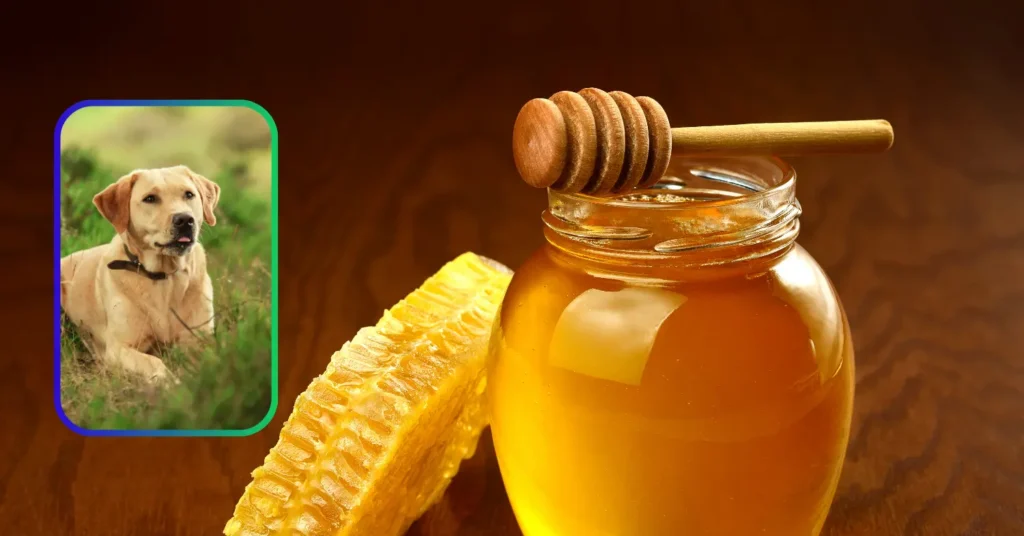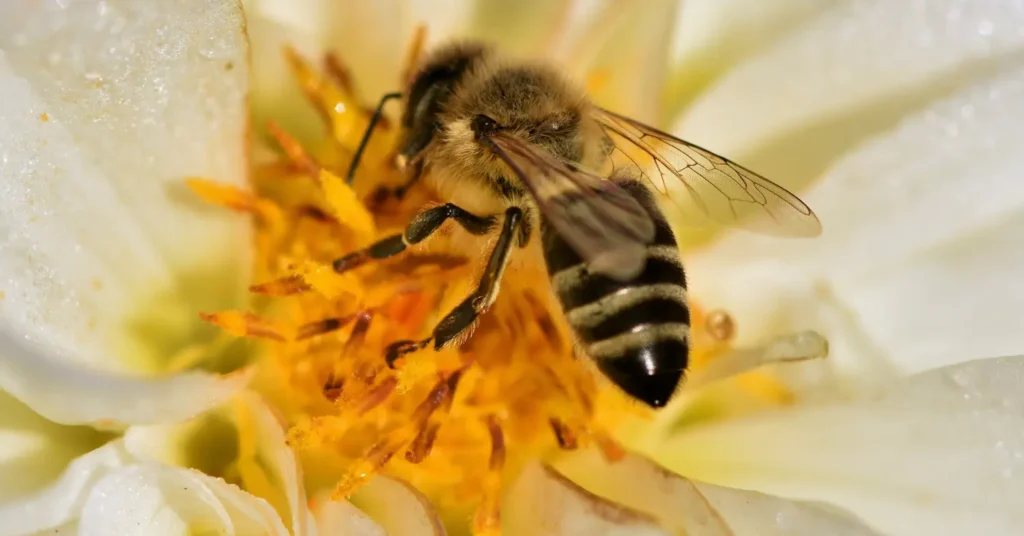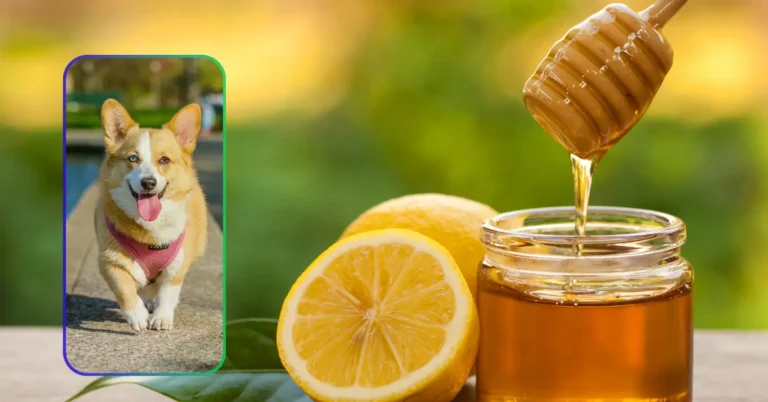Can dogs eat honey? Honey is a natural product that is made by bees from the nectar of flowers. It contains sugar, vitamins, minerals, and antioxidants. Honey has been used medicinally for centuries and has a variety of health benefits. There are no definitive studies on whether or not honey is safe for dogs to eat, but most experts believe that it is. Honey is not toxic to dogs, and in small amounts, it can be a healthy treat.
Another Interesting Read: Can Dogs Eat Peas? Risks And Benefits Of Peas
So, if you’re wondering “can dogs eat honey?” the answer is yes! Just be sure to give your pup only a small amount of honey, and monitor them for any potential side effects. As with anything, it’s always best to consult with your veterinarian before giving your dog any new food or treat.
Can Dogs Eat Honey?

Most dogs love the taste of honey, and it can be a healthy treat in moderation. Honey is a natural source of energy and contains vitamins and minerals that can be beneficial for your dog. However, honey should not be a staple part of your dog’s diet, and there are a few things to keep in mind when feeding honey to your dog.
honey is generally safe for dogs, with many pet owners utilizing it as a natural remedy for ailments like coughs, digestive issues, and allergies. However, introducing honey gradually and in moderation is crucial, preventing any potential adverse reactions.
Important Note: Raw honey is not suitable for puppies under one year, as their developing immune systems might struggle with potential bacteria found in raw honey.
1. Choose Raw, Unfiltered Honey
The best type of honey for your dog is raw, unfiltered honey. This type of honey contains the most nutrients and has not been processed or heated, which can destroy some of the beneficial properties of honey. Raw honey may also contain pollen, which can be beneficial for your dog’s allergies.
2. Avoid Giving Honey to Puppies
Puppies have sensitive stomachs and their digestive systems are not yet fully developed. For this reason, it’s best to avoid giving honey to puppies until they are at least six months old. If you do give your puppy honey, start with a small amount and watch for any adverse reactions.
3. Know the Risks of Honey
Although honey is generally safe for dogs, there are a few risks to be aware of. Honey may contain bacteria that can cause botulism in dogs. This is a rare but serious condition that can be fatal. If you notice your dog showing any signs of illness after eating honey, seek veterinary care immediately. Symptoms of botulism in dogs include weakness, paralysis, and difficulty breathing.
4. Feed Honey in Moderation
Honey should only be given to your dog in moderation. Too much honey can cause weight gain and an upset stomach. When feeding honey to your dog, start with a small amount and see how they respond. If they seem to tolerate it well, you can gradually increase the amount you give them.
5. Use Honey to Treat Allergies
If your dog has allergies, raw honey may help to relieve their symptoms. Honey contains pollen, which can help to desensitize your dog to the allergens that they are exposed to. Feeding your dog a small amount of honey each day may help to reduce their allergic reactions.
Nutritional Value Of Honey

Honey is a natural sweetener that has been used for centuries. It is made by bees from the nectar of flowers and has a wide range of health benefits. Nutritionally, honey is a good source of energy and contains vitamins, minerals, antioxidants, and enzymes. It also has antibacterial and anti-inflammatory properties.
The nutritional value of honey varies depending on the type of honey and the flowers that the bees collect nectar from. For example, Manuka honey is a type of honey that is produced in New Zealand and Australia from the nectar of the Manuka tree. This honey is especially high in antioxidants and has been shown to have medicinal properties.
Honey is a natural source of energy and has been used as a performance-enhancing supplement by athletes for centuries. The carbohydrates in honey are easily digested and provide a quick source of energy. Honey also contains small amounts of protein, vitamins, minerals, and antioxidants.
Health Benefits Of Honey for Dogs

Honey is a sweetener that has been used for centuries. It is made by bees from the nectar of flowers and has many health benefits. Honey is often used as a natural remedy for coughs and colds. It can also be used topically on the skin to help heal wounds and fight infections. There are some other health benefits of honey that are not as well known but are just as important.
How Can Honey Alleviate Allergies in Dogs?
Honey’s natural antibacterial and anti-inflammatory properties are believed by some to alleviate allergy symptoms in dogs. While claims suggest it can ease seasonal allergies, vets caution that evidence supporting this notion is lacking. Allergic reactions in dogs can manifest in various ways, from skin irritations to digestive issues, emphasizing the importance of consulting a vet promptly.
Can Honey Help with Kennel Cough?
Kennel cough, marked by a dry, hacking cough, might find relief in honey’s soothing properties. However, it’s essential to consult a vet for appropriate treatment, considering that not all conditions require the same approach.
Can Honey Substitute Traditional Medicines?
Despite inconclusive research, some veterinarians may recommend honey as an alternative treatment due to its anti-inflammatory, antioxidant, and antibacterial properties. Used to soothe sore throats when consumed and applied topically for burns, honey can be a versatile aid.
Is Honey Effective for Wound Treatment?
For minor cuts on dogs, medical-grade manuka honey, renowned for its antibacterial properties, can aid in preventing infection and promoting healing. However, caution is advised, as not all types of honey are safe for dogs, and consulting a vet is paramount.
How to Safely Introduce Honey to Dogs

Moderation is key when offering honey to dogs, with around a teaspoon a day being generally acceptable, depending on the dog’s size. Introduce honey gradually, monitoring for adverse reactions such as vomiting or diarrhea. Opt for raw honey without artificial sweeteners or additives for the best results.
Creative Ways to Include Honey in Your Dog’s Diet
Its low moisture content poses a challenge for bacteria growth, while the production of low levels of hydrogen peroxide acts as a gentle antiseptic, safeguarding the healing tissues.
Honey isn’t just about healing; it’s a multitasker. It contributes to pain reduction and inflammation control, offering holistic relief for your dog’s skin issues. The enzymes present in honey play a crucial role in stimulating healthy skin growth, promoting a speedier recovery.
Pro Tip: If the honey proves a bit thick, consider a warm water bath to enhance its spreadability. After application, cover the treated area with bandages to deter your pup from licking off this natural remedy. Your dog’s comfort is just a jar of honey away!
How Much Honey is Safe for Your Dog?

Even though honey is a natural sugar source, it can pose issues for diabetic, obese, or immunodeficient dogs. When in doubt, consult your vet before sharing this sticky treat.
Delving into the nitty-gritty, a teaspoon of honey packs 17 grams of sugar and 70 calories. Moderation is key, and most dogs can benefit from a daily dose of 1 teaspoon. Tailoring it to your dog’s size, here’s a quick guide:
Yes, dogs can enjoy honey in small quantities, keeping it safe for their well-being.
While honey is generally safe, moderation remains crucial. Overindulgence might lead to elevated blood sugar levels, resulting in symptoms like vomiting, diarrhea, or loss of appetite. Should you notice these signs, a chat with your vet is in order. Prioritize your dog’s well-being, making the honey experience a sweet and safe one.
Potential Risks of Honey For These Dogs

Dogs, much like humans, can have varied reactions to honey, especially those sensitive to bee stings. If you’re considering introducing honey into their diet, it’s advisable to start with a minimal amount, perhaps a single drop per day, and gradually increase it. Vigilance for any signs of allergic reactions is crucial during this process.
The immune systems of puppies are still in the developmental stage, making them susceptible to certain risks. Raw honey, though a natural delight, may carry botulism spores that pose potential gastrointestinal issues for these young canines.
For diabetic dogs, caution is paramount. Honey’s elevated sugar content can lead to undesirable spikes in their blood sugar levels, making it an unsuitable addition to their diet.
Overweight or obese dogs, already burdened by excess weight, should steer clear of the additional sugar found in honey. Fortunately, there are numerous alternatives to consider for providing healthy snacks.
Dogs with compromised immune systems face particular risks associated with honey consumption. Conditions such as auto-immune diseases, cancer, lupus, or diabetes categorize them in this group due to the potential presence of botulism spores in honey.
Another less obvious concern is tooth decay, resulting from the high sugar content in honey. A proactive measure to counter this risk involves regular brushing of your dog’s teeth on a weekly basis, ensuring their overall dental health is maintained.
When To Avoid Feeding Honey To Dogs

As a pet owner, you may be wondering if you can share your honey with your furry friend. After all, honey is a natural product and dogs love sweet things. However, there are some important considerations to take into account before giving your dog honey.
Honey can contain harmful bacteria that can make your dog sick. This is especially a concern for puppies and senior dogs, whose immune systems may not be as strong.
Honey can also contain high levels of sugar, which can lead to weight gain and other health problems. If your dog is already overweight, feeding them honey is likely to make the situation worse.
For these reasons, it’s best to avoid feeding honey to your dog altogether. If you do want to give them a treat, there are many other options available that are safer and healthier for them. Choose a product made specifically for dogs, such as dog biscuits or chew toys. These will be tailored to your dog’s nutritional needs and will not pose the same risks as honey.
Conclusion | Can Dogs Eat Honey?
While honey is a healthy and natural product for humans, it can be harmful to dogs. Honey can contain bacteria that can make them sick, and it also contains high levels of sugar which can lead to weight gain and other health problems. There are many other safe and healthy treats available for dogs, so it is best to avoid giving them honey.
You Might Also Like:




